The Shark is Broken: The story of the infamous feud on the set of Jaws
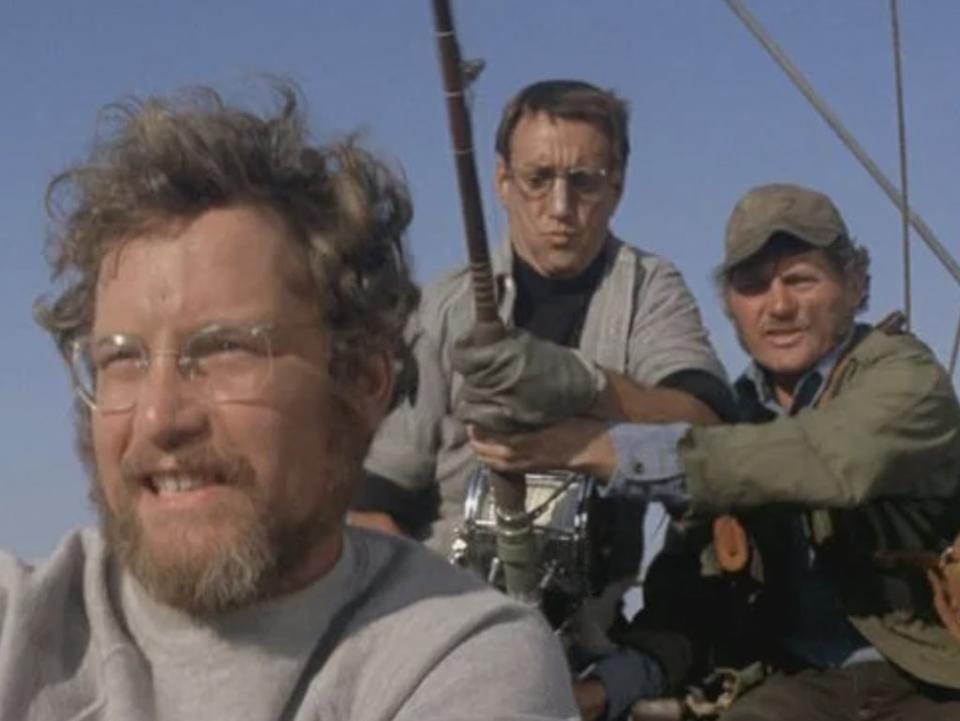
The most ferocious thing on the set of Jaws was not the great white shark; it was the animosity between two of the film’s stars, Robert Shaw and Richard Dreyfuss.
The actors’ compelling off-screen acrimony translated into compelling on-screen acrimony between the two rival shark hunters, Quint (Shaw) and Hooper (Dreyfuss).
Their antipathy was only exacerbated by the long and frustrating hiatuses on the Martha’s Vineyard set during the summer of 1974 as the actors waited for the three frequently broken mechanical sharks – all nicknamed “Bruce” after the director Steven Spielberg’s lawyer – to be fixed.
Out of this potentially disastrous shoot came one of the world’s most brilliant films – and one of cinema’s most vituperative feuds. It makes the vicious clashes between Betty Davis and Joan Crawford on Whatever Happened to Baby Jane? look like a pacifists’ tea party.
The venomous, alcohol-fuelled hostility between Shaw and Dreyfuss has now been crafted into a terrific play entitled The Shark is Broken. Written by Shaw’s son Ian and Joseph Nixon, it tells the behind-the-scenes story of the movie from the shark's mouth.
It depicts the salty-sea-dog, gnarly veteran actor Shaw (portrayed by his own son Ian), incessantly tearing into the younger, pretentious and fame-hungry thesp, Dreyfuss (Liam Murray Scott).
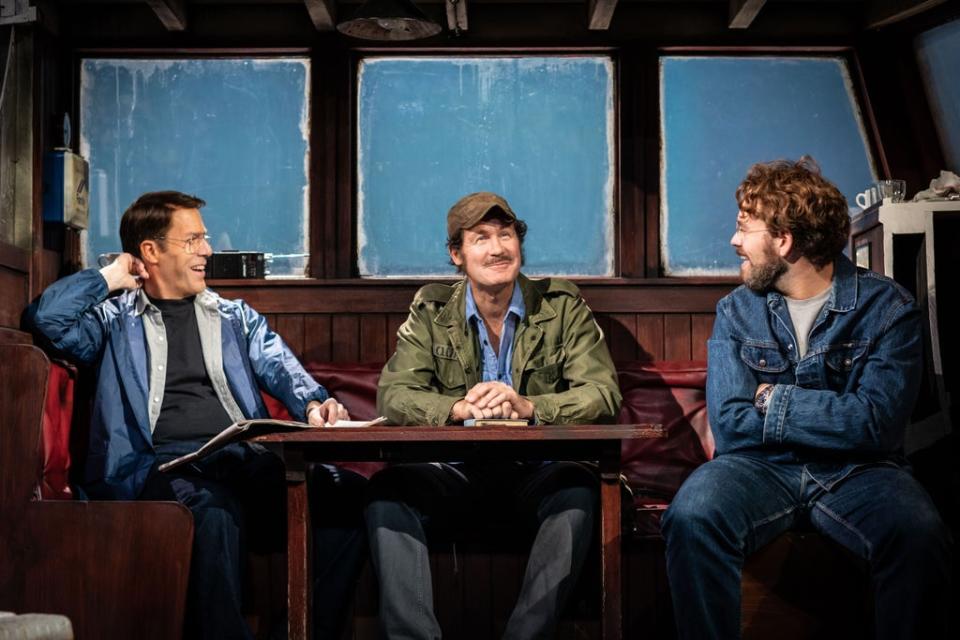
The play emphasises that – as much as Spielberg’s stunning direction (he was very much influenced by Alfred Hitchcock’s philosophy that what you don’t see is much scarier than what you do see) and John Williams’ deathless score – it is the bitterly fractious relationship between Quint and Hooper which makes the movie so memorable.
At one point in the play, Shaw sneers at his co-star that, “the lights are on, but nobody’s home” and “you sound like a village idiot”. Later, the older actor, a serious alcoholic, attempts to strangle Dreyfuss when, in the midst of a furious row, he throws Shaw’s bottle of grog over the side of their boat, Orca.
Roy Scheider (Demetri Goritsas), who plays the mild-mannered police chief Brody in the movie, is caught between these two hammered sharks as a mostly ineffectual peacekeeper.
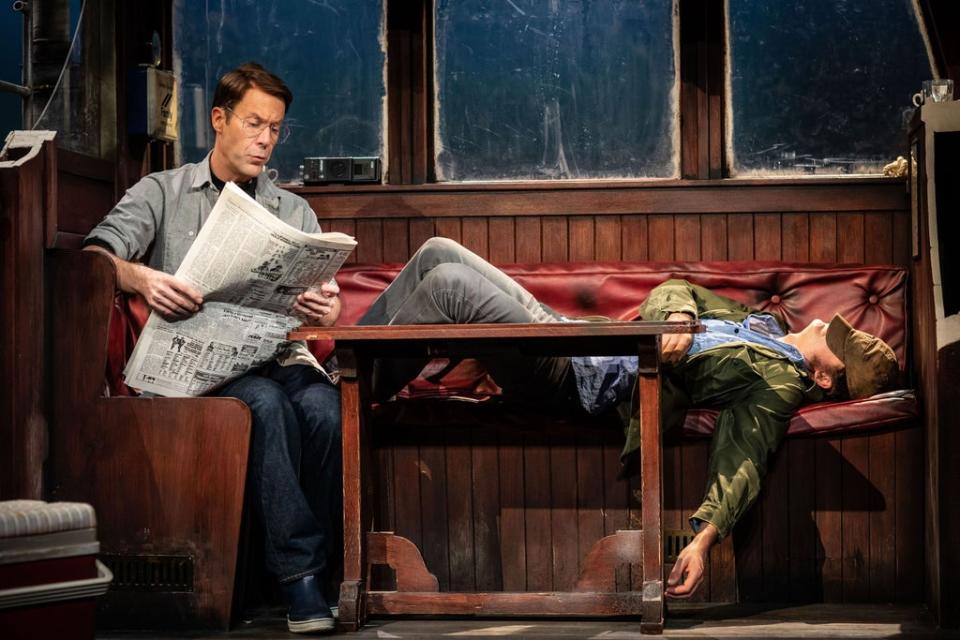
The Shark is Broken is full of witty one-liners. Contemplating the venality of the resigning President Nixon, Scheider says: “There will never be more immoral president.” Then, when Shaw discloses that he has nine children, Scheider jokes: “You’re going to need a bigger boat.”
The play is Rosencrantz and Guildenstern Are Dead meets Waiting for Godot meets The Caretaker – at sea. It has already enjoyed a sold-out run at the 2019 Edinburgh Fringe, where it generated boatloads of very positive reviews, many of which concluded: “They're going to need a bigger theatre.”
Which it now has. The Shark is Broken is playing at the Ambassadors Theatre in the West End of London until 13 February. The show has, you’ll be delighted to learn, tremendous bite. Like the movie – or indeed, the great white shark itself – the play gets you in its grip and won’t let go.
He’s very fondly remembered by us all. I was very young when he died. I was just eight years old. At that age, you idolise your father, and he was very easy to idolise
Ian Shaw got vivid first-hand evidence of the lasting enmity between the two actors when he auditioned for Dreyfuss, who was directing Hamlet at the Birmingham Rep in 1994.
Speaking to The Independent by video link from his home in a Sussex village, Shaw takes up the story. “I had forgotten that Robert and Richard weren't best friends. For some reason, I was expecting to be welcomed with open arms.
“My father did a swashbuckling film with James Earl Jones, and when I met James on Broadway, I was engulfed in a hug by him. So I was expecting at least a high five from Richard. But it was a bit like I’d given him some off cheese. His face just said it all.”
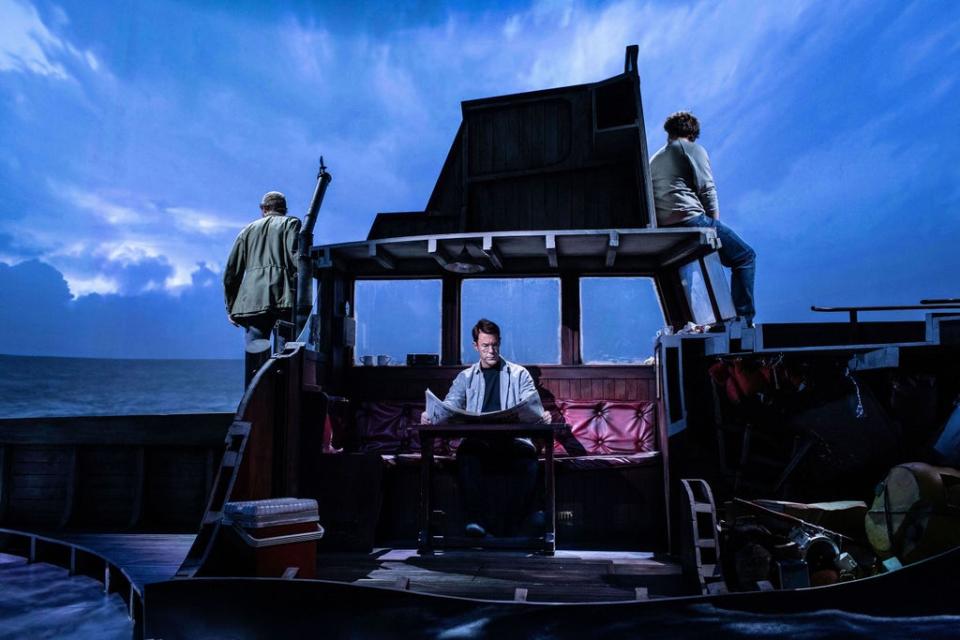
Shaw, who was only eight when his 51-year-old father died in 1978, continues: “Richard did make a comment to me that day, but it was something along the lines of ‘the memories are coming back to me’. But it was quite clear that they weren’t all good memories!”
That brief encounter gave Shaw the germ of an idea for a play, but for many years he didn’t think any more about it. Then, the actor-writer recalls: “I was doing a part where I had a moustache and I realised I was starting to look like Quint. I thought that was odd.
“I'd also done a drama documentary about Hiroshima. So I thought that was odd as well. It was if I was collecting the bomb from my dad, who in Jaws makes that big speech about delivering it on the USS Indianapolis.”
The 51-year-old writer, who gives a mordant performance as his father in The Shark is Broken, proceeded “to sketch a few ideas down about what would happen if three very interesting men at different stages of their careers with different personalities were stuck together.
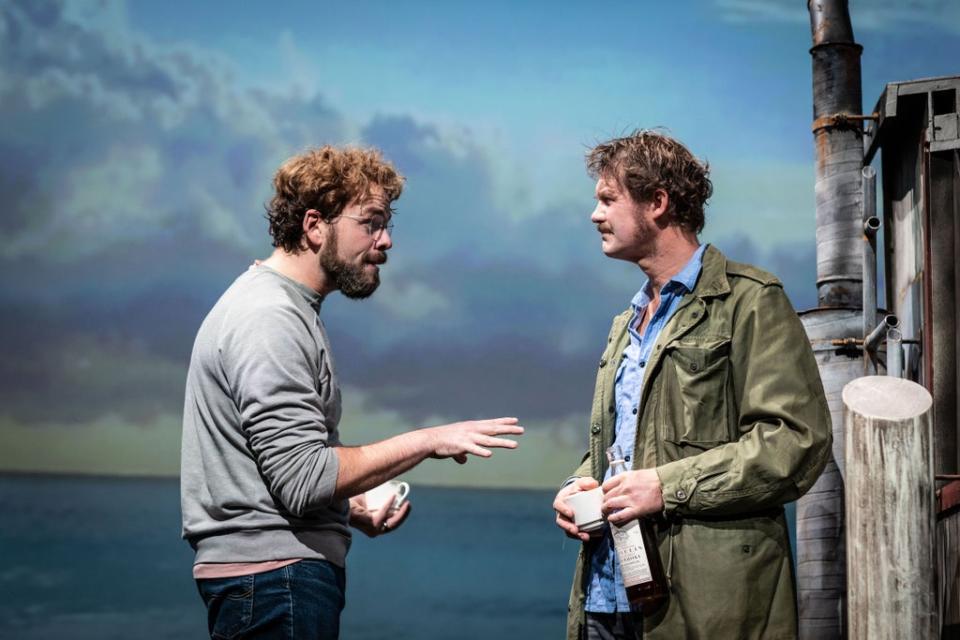
“But then I shoved it in a drawer for quite a long time because I thought that it was presumptuous and potentially quite embarrassing for me to wade into a film that I really like. Also, my family might take offence.”
However, Shaw eventually plucked up the courage to mention the concept to a theatre producer friend, “and he thought it was a terribly good idea. Then I told a few other people and they thought it was a terribly good idea, too, which I found quite annoying! It was that thing of ‘now I have to write the damn thing – and it better be good!’”
So he went ahead and wrote The Shark is Broken, but even then he was nervous about his family’s reaction to it. “They were slightly hesitant until I sent them the script which they really enjoyed. They were very supportive from that point on.”
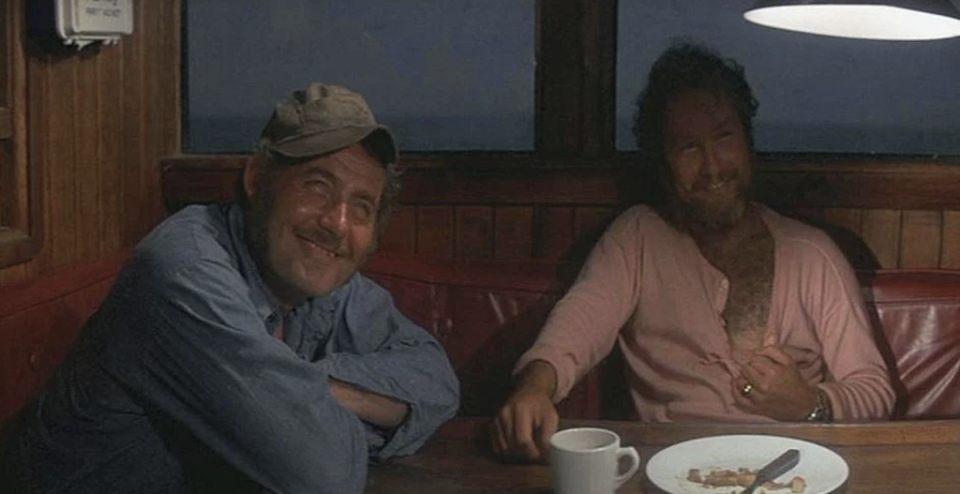
The playwright feels nothing but love his father. “We all love Robert. He’s very fondly remembered by us all. I was very young when he died. I was just eight years old. At that age, you idolise your father, and he was very easy to idolise. He was larger than life, a fearless man who had a great deal of charm and an enormous sense of humour at home.”
However, for the purposes of the play, Ian Shaw realised he had to bring out his father’s darker side. “It’s more dramatic and interesting when he’s in a pressure situation. He could relax at home and was very convivial with the family. But that’s kind of boring on stage, isn’t it? So it is a heightened Shaw in the play, but I think it’s truthful.”
The writer admits that it was difficult to portray his father in such a harsh light. “I did worry about that, but I felt we rode a line. Robert didn’t suffer fools gladly. He wasn’t frightened of anybody at all and he would assert himself. So perhaps it’s an exaggerated version of him in this play, but I don’t think it’s a million miles from the truth.”
Robert doesn’t hate Richard at all. But he’s angry with him and wants him to focus on the acting and stop worrying about fame
For all that, the playwright hopes that his profound affection for his father shines through in the writing. “I hope that comes across, because he was a wonderful man. But he was also complex, as we all are.”
Guy Masterson, the director of The Shark is Broken, sees the play as a universal study of what it feels like to be marooned. It’s a sort of Three Men on a Boat: The Tragic Version.
“When I first received the play, I was expecting much more of a surface-y homage to Jaws,” the 60-year-old director says, “but actually it goes in a completely unexpected direction. You get Jaws all the time and with all the references and the noise outside and the shark and Bruce and Steven. That anchors the play.”
But actually, “what you’re getting is a really heartfelt, deep, powerful narrative piece of psychological drama. Three men are stuck on a boat for an extended period of time. Will they kill each other?” In that, The Shark is Broken echoes the central theme of Jean-Paul Sartre’s great existentialist play Huis Clos: hell is other people.

At the heart of The Shark is Broken, of course, is the running feud between Shaw and Dreyfuss. Masterson explains why he thinks these two powerhouse actors are continually butting heads. “Dreyfuss’s American openness and neuroticism clashes with Shaw’s very English, down-to-earth, ‘learn your lines and don’t bump into the furniture’ approach. The American sensibility is constantly clashing with the English sensibility.
“Shaw’s fundamental old fogey-ism is coming through. He’s offended by Dreyfuss’s brashness and wants to slap him down. He corrects the American’s language all the time. He feels this enmity towards the younger generation of actors – ‘why do I have to deal with these people?’ – and it's all focused through the lens of Dreyfuss.”
Shaw weighs in that it is very much a war of styles between the two contrasting actors. “Robert doesn’t hate Richard at all. But he’s angry with him and wants him to focus on the acting and stop worrying about fame. At that time, Richard was already talking about going to the celebrity restaurant Sardi’s and signing autographs, and Robert felt that he hadn’t earned the right yet. He wanted to be a tough coach or a sergeant major for him.”
Shaw certainly believed that his brutal attitude towards Dreyfuss was helping the younger man. According to Masterson, “Dreyfuss knew the effect that Shaw had on him and his career, but also the pain that he caused him to get there.
“One of my favourite lines in the play is where Shaw tells Scheider, ‘it is the grit in the oyster that produces the pearl, Roy. I’m that grit. Richard will give a better performance because of me.’ That sums up the whole journey. Shaw is saying, ‘I respect Richard well enough to give him what he needs to become a good actor. I want to steer him off that artificial, ambitious, neurotic drive and make him see what real acting is’.”
And it worked. Dreyfuss went on to have an acclaimed career in films such as Close Encounters of the Third Kind (also directed by Spielberg), Mr Holland’s Opus and The Goodbye Girl, for which he became the youngest ever winner of the Best Actor Oscar at the age of just 30.
Another reason why Shaw is so hard on the younger actor is because, “he recognises too much of himself in Dreyfuss”, Masterson reflects. “He is almost dealing with his old self through Dreyfuss and, of course, the more Shaw drinks, the more his resentment bubbles to the surface. That is worsened by their sense of incarceration. They were expecting four weeks at sea, and they got 16.”
The other element that feeds into Shaw’s alcoholic self-loathing is the sense that acting is somehow beneath him; what he really wanted to be was a writer.
Masterson muses: “Shaw won the Hawthornden Prize in 1962 for his novel The Sun Doctor and a Tony in 1967 for his play The Man in the Glass Booth. He knew he was a very, very good writer, but he wanted to be a great writer. So his disdain for acting was because he fundamentally wanted to be a writer.
We had a few smiles about the fact that we were coming back into the West End after lockdown because people would inevitably identify with the three characters trapped in the same place
“At the end of the play, Shaw says, ‘I love my wife, I love my kids, but just put me on a desert island with a golf course, the occasional visitor and a typewriter’.”
One of the most memorable moments of the play is the electric shock you get when you first see Ian Shaw stride on stage looking the spitting image of Quint, from the ragged moustache and sideburns to the battered jacket and cap.
According to Masterson, “there is an extraordinary coup de theatre when Ian walks out, and you go, ‘oh my god, whoa, whoa, what am I seeing? I’m in the presence of Quint himself!’ Of course, Ian is so like his father in so many ways. He says that playing him is like putting on a glove.”
It is a really moving experience for Ian to portray his father every evening. “I lost him when I was eight, so it’s very poignant. For certain roles, you have to psych yourself up to play them, but it’s not hard to feel that this matters each night. I don’t have any difficulty believing in the show, as I know it’s about him. But it feels very keenly that it’s to do with my own life as well. It’s very emotional.”
All the same, Ian confesses that he is not going to hang on to Quint’s trademark moustache after The Shark is Broken finishes its West End run. “When we down tools, I will lose the moustache. I live in a small village in Sussex, and people think I’m slightly odd because I’m not sure if they all know what I’m doing. They just think this is my idea of fashion!”
After 18 months enduring various forms of lockdown, audiences are relating to the sense in the play of the characters having no escape from each other. Shaw says: “We had a few smiles about the fact that we were coming back into the West End after lockdown because people would inevitably identify with the three characters trapped in the same place.
“The nature of drama is conflict, and the Sartre play Huis Clos works so well because those three characters are trapped and in conflict. It’s a wonderful device to have people stuck together. That’s why the Orca is another very important character in the play because it’s so cramped.”
Finally, what has the reaction of 74-year-old Dreyfuss been to The Shark is Broken? “We didn’t want to go ahead without his blessing,” Masterson reveals. “So we sent the play to him and he loved it. He laughed a lot. He said, ‘I will let you go ahead with this if you give me opening night tickets’.”
How would Ian respond if Dreyfuss came to see him in his dressing room after watching the show, then? “I would give him a big hug. I’ve always admired Richard’s work. I think he is the most wonderful actor, and I have absolutely no issues with him. I have only gratitude towards him for helping Jaws to be so successful.”
And perhaps Dreyfuss wouldn’t have such a horrified look on his face when he set eyes on Ian this time?
“I hope not!”
‘The Shark is Broken’ is running at the Ambassadors Theatre in London until 13 February. Tickets are available here
Read More
Bruce, the last ‘Jaws’ shark, docks at the Academy Museum
Great white shark lured to fisherman's boat in Jaws-like incident off Jersey Shore
The extreme fishermen on the hunt for a prehistoric monster in Wisconsin
Richard Dreyfuss causes chaos after swearing live on The One Show

 money
money 